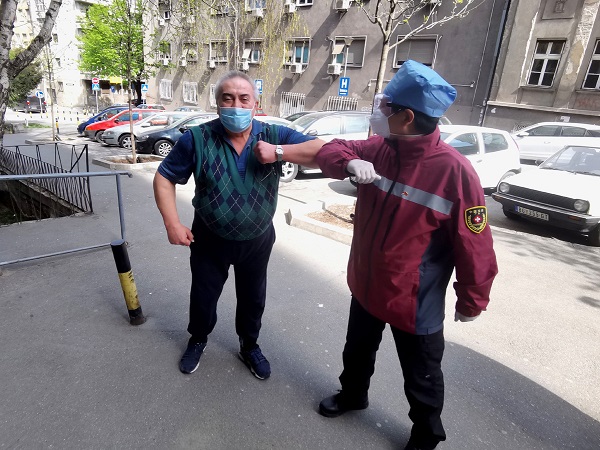Disease guru's candor wins over Serbia

Peng Zhiqiang, right, an infectious disease expert from China, greets a Serbian resident with a elbow touch in Belgrade, capital of Serbia, on April 11, 2020. [Photo/Xinhua]
During his first meeting with Serbian Prime Minister Ana Brnabic and other members of the country's COVID-19 crisis response team in late March, Peng Zhiqiang, an infectious disease expert from China, received three questions centering on treatment: What drugs are effective? How many respirators are needed? Is traditional Chinese medicine effective?
While he understood the Serbian people's earnest desire to cure patients and reduce mortality rates, Peng thought they were missing the point and chose to divert attention to a more crucial aspect.
"We believed that at the time, the priority was to tackle the source of infections and stem the spike in new cases. Only when we are able to flatten the curve can we be more committed to exploring lifesaving treatment," Peng said.
Peng left the military in 2007 and has since been working at the Guangdong Provincial Center for Disease Control and Prevention. For more than a decade, he has dealt with a procession of virulent threats and has learned the value of candor amid a health emergency.
The trip to Serbia, a country he had never visited before or heard much about, did not deter him from disagreeing, arguing and defending the integrity of science-and evidence-based disease-control strategies.
"We were sent there by our home country for our expertise in staving off viral outbreaks, and Serbia has embraced our arrival and shown great respect for our work," Peng said. "For us, the single most important task was to share valuable experiences from China in battling the disease and express our most authentic thoughts.
"Later, we also showed them how to centralize treatment of severe cases, use oxygen supplements to prevent mild infections from escalating and divide hospital areas into partitioned zones. However, the crux of our work there was to raise awareness about the significance of reining in new infections."
Peng's outspoken and candid personality won the trust of the Serbian authorities and people.
Initially, the six-member aid team he headed was scheduled to stay in Serbia for about 15 days. In response to multiple requests from the country, the team delayed their return three times and eventually worked for 82 days.
"We agreed that if we had left Serbia without seeing the outbreak showing signs of coming under control, it would be an incomplete mission," he said.
"When we first arrived, Serbia reported over 400 new infections each day. Through a series of steps, such as imposing curfews, stepping up testing and building a temporary treatment center, the number gradually dropped to as low as 18 new cases in one day during our stay."
During their stay in Serbia, local residents developed a special bond with the small group of Chinese experts, who always wore face masks and their signature crimson jackets while shuttling between hospitals, elderly care homes and neighborhoods.
"Sometimes, I would appear on local television, offering recommendations on personal protection and reminding ill Serbians to avoid gatherings and to voluntarily visit hospitals. We were told that local people were more likely to follow the opinions from Chinese experts," Peng said.
"One day, an older Serbian person who caught sight of us gestured to us and shouted thanks for helping Serbia. We responded with an elbow bump."
Like many countries around the world, Serbia is now grappling with a resurgence of the virus, with daily new cases rebounding to as high as 300.
Peng said the flare-up of the virus in Serbia is partially due to the hastened reopening of its borders and the restarting of social activities as the country is under pressure to stimulate its economy.
"The dichotomy between anti-virus measures and resumption of work is confronting many more countries across the world," he said. "I think the Chinese strategy-featuring swift and strict screening and wide implementation of social distancing-will continue to garner recognition."
